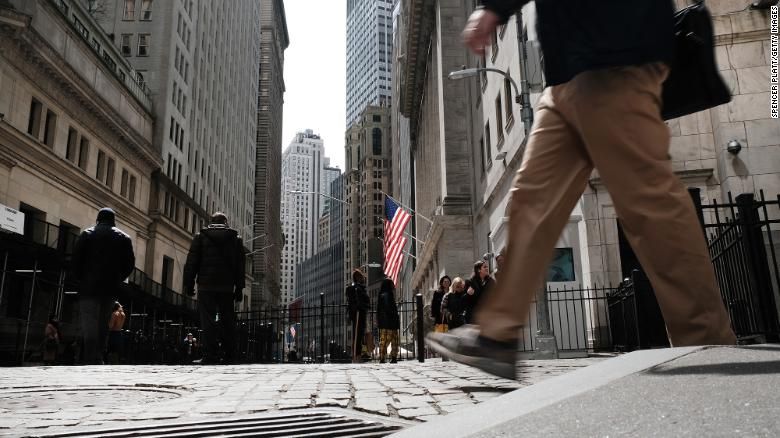Most CEOs are bracing for a recession

By Matt Egan, CNN Business
The mood in the C-Suite is darkening.
CEO confidence has tumbled to the weakest level since the beginning of the Covid-19 pandemic, The Conference Board said Wednesday.
For the first time during the economic expansion, CEO confidence is now in negative territory.
Worse, business leaders are bracing for a potential downturn caused by the Federal Reserve’s quest to tame inflation.
A staggering 68% of CEOs surveyed by The Conference Board expect the Fed’s war on inflation will eventually trigger a recession. The survey, fielded between April 25 and May 9, measured responses from 133 CEOs of mostly public companies.
The good news is that just 11% of CEOs anticipate a so-called hard landing, marked by a deep recession. The rest expect a “very short, mild” recession.
Importantly, business leaders are not necessarily preparing for an imminent recession. The survey did not specify when the downturn would begin, merely describing it as “over the next few years.”
Inflation triggers recession fears
Still, the pessimism among CEOs is striking, especially given that the economic recovery is barely two years old and enjoyed blockbuster growth in 2021.
“Businesses are being challenged on so many fronts right now and CEOs have elevated expectations of a recession,” Dana Peterson, The Conference Board’s chief economist, told CNN.
That’s despite the fact that by many measures, the US economy remains strong. Retail sales are growing at a healthy clip, the jobs market has nearly returned to pre-Covid levels of employment and businesses are spending aggressively.
Yet the economic environment has gotten tougher to navigate, with worker shortages, price spikes and the war in Ukraine creating challenges. Even some large corporations are struggling.
Walmart, the king of retail, dimmed its earnings outlook on Tuesday because of high inflation and supply chain constraints. Walmart shares plunged 11%, the company’s worst one-day decline since October 1987.
60% of CEOs expect conditions to worsen
Walmart is not alone. Sixty-one percent of CEOs surveyed by The Conference Board reported that economic conditions have worsened over the past six months, compared with 35% who said that during the first quarter. Just 14% of CEOs reported improving economic conditions.
Recession fears have been driven in large part by high inflation.
Prices are rising at such a rapid clip that the Fed doesn’t have the luxury of merely tapping the brakes on the economy by gradually raising interest rates. To get inflation under control, the US central bank may have to slow the economy so much that it accidentally ends the recovery.
“Recessionary-concerns are real,” Mike Sommers, CEO of the American Petroleum Institute, told CNN. He noted that history shows recessions often follow rapid interest rate hikes.
Perhaps that’s one reason 60% of CEOs surveyed by The Conference Board expect conditions to worsen, up from just 23% who said that last quarter.
Business leaders similarly reported difficulty attracting qualified workers, signaled wage growth will remain elevated and downgraded their forecasts for business investment.
Of course, many companies have been able to thrive during this high-inflation period, in part by raising prices on consumers.
More than half (54%) of the CEOs in the survey said they are managing rising input costs by passing them along to customers.
Self-fulling prophesy
Given the strong momentum from last year, many economists expect the economy will continue growing for now.
For instance, The Conference Board is projecting modest GDP growth of 2.25% this year, down from 6% in 2021.
Over the weekend, Goldman Sachs trimmed its GDP outlook, but it’s still projecting growth of 2.4% this year and 1.6% next year.
“Concerns about an immoderate near term recession are generally overblown,” said RSM chief economist Joe Brusuelas.
Yet Brusuelas said it will be nearly impossible for the Fed to engineer a soft landing.
“The Fed is attempting to thread the needle while wearing boxing gloves and a mouth guard which reduces its degrees of freedom to act without causing damage to the real economy,” he said.
Still, the gloomy mood from The Conference Board survey raises the risk of a self-fulfilling prophesy, one in which a recession occurs because businesses hunker down in anticipation of one.
“You can always talk yourself into a recession,” Peterson said. “If businesses start shedding jobs in anticipation of a recession, that is going to spook consumers — and that can get us into a recession.”
Lloyd Blankfein, the senior chairman of Goldman Sachs, suggested over the weekend that a recession is not a foregone conclusion, telling CBS News it’s not “baked in the cake.”
Still, he said: “It’s definitely a risk. If I were running a big company, I would be very prepared for it.”
The-CNN-Wire
™ & © 2022 Cable News Network, Inc., a WarnerMedia Company. All rights reserved.
